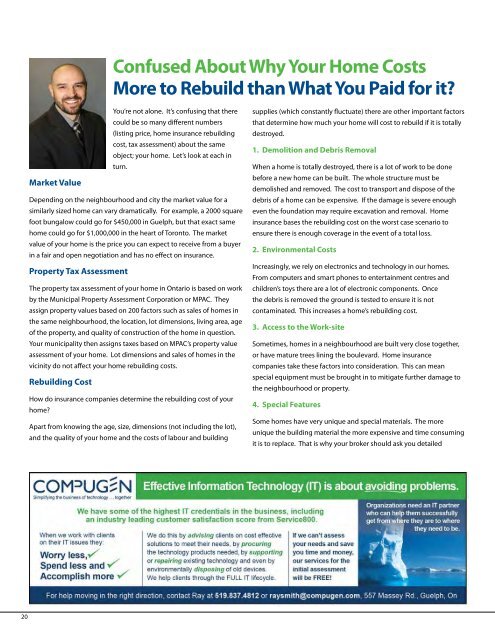Download - Guelph Chamber of Commerce
Download - Guelph Chamber of Commerce
Download - Guelph Chamber of Commerce
Create successful ePaper yourself
Turn your PDF publications into a flip-book with our unique Google optimized e-Paper software.
Confused About Why Your Home Costs<br />
More to Rebuild than What You Paid for it?<br />
You’re not alone. It’s confusing that there<br />
could be so many different numbers<br />
(listing price, home insurance rebuilding<br />
cost, tax assessment) about the same<br />
object; your home. Let’s look at each in<br />
turn.<br />
Market Value<br />
Depending on the neighbourhood and city the market value for a<br />
similarly sized home can vary dramatically. For example, a 2000 square<br />
foot bungalow could go for $450,000 in <strong>Guelph</strong>, but that exact same<br />
home could go for $1,000,000 in the heart <strong>of</strong> Toronto. The market<br />
value <strong>of</strong> your home is the price you can expect to receive from a buyer<br />
in a fair and open negotiation and has no effect on insurance.<br />
Property Tax Assessment<br />
The property tax assessment <strong>of</strong> your home in Ontario is based on work<br />
by the Municipal Property Assessment Corporation or MPAC. They<br />
assign property values based on 200 factors such as sales <strong>of</strong> homes in<br />
the same neighbourhood, the location, lot dimensions, living area, age<br />
<strong>of</strong> the property, and quality <strong>of</strong> construction <strong>of</strong> the home in question.<br />
Your municipality then assigns taxes based on MPAC’s property value<br />
assessment <strong>of</strong> your home. Lot dimensions and sales <strong>of</strong> homes in the<br />
vicinity do not affect your home rebuilding costs.<br />
Rebuilding Cost<br />
How do insurance companies determine the rebuilding cost <strong>of</strong> your<br />
home?<br />
Apart from knowing the age, size, dimensions (not including the lot),<br />
and the quality <strong>of</strong> your home and the costs <strong>of</strong> labour and building<br />
supplies (which constantly fluctuate) there are other important factors<br />
that determine how much your home will cost to rebuild if it is totally<br />
destroyed.<br />
1. Demolition and Debris Removal<br />
When a home is totally destroyed, there is a lot <strong>of</strong> work to be done<br />
before a new home can be built. The whole structure must be<br />
demolished and removed. The cost to transport and dispose <strong>of</strong> the<br />
debris <strong>of</strong> a home can be expensive. If the damage is severe enough<br />
even the foundation may require excavation and removal. Home<br />
insurance bases the rebuilding cost on the worst case scenario to<br />
ensure there is enough coverage in the event <strong>of</strong> a total loss.<br />
2. Environmental Costs<br />
Increasingly, we rely on electronics and technology in our homes.<br />
From computers and smart phones to entertainment centres and<br />
children’s toys there are a lot <strong>of</strong> electronic components. Once<br />
the debris is removed the ground is tested to ensure it is not<br />
contaminated. This increases a home’s rebuilding cost.<br />
3. Access to the Work-site<br />
Sometimes, homes in a neighbourhood are built very close together,<br />
or have mature trees lining the boulevard. Home insurance<br />
companies take these factors into consideration. This can mean<br />
special equipment must be brought in to mitigate further damage to<br />
the neighbourhood or property.<br />
4. Special Features<br />
Some homes have very unique and special materials. The more<br />
unique the building material the more expensive and time consuming<br />
it is to replace. That is why your broker should ask you detailed<br />
20




